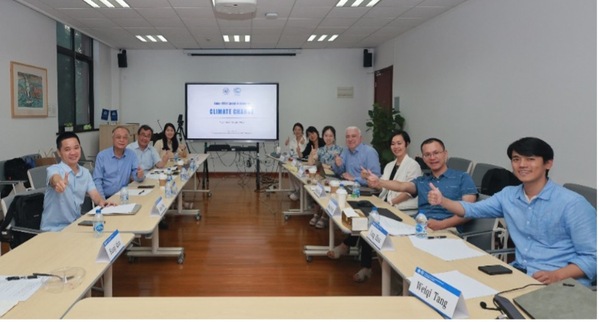Author: Release date:2024-08-09 12:29:48Source:发展研究院英文
On August 7, 2024, Fudan University (FDU) and the Secretariat of the United Nations Framework Convention on Climate Change (UNFCCC) successfully held a special workshop on climate change at the Think Tank Building at Fudan University. The workshop focused on the scientific and technical support needed to address gaps in the post-stocktake governance process of global climate governance and the new ambitious Nationally Determined Contributions (NDCs) targets and roadmaps. The special workshop also covered the potential contributions of Fudan University's scientific research and technological innovations to the global climate change adaptation and governance system. Mr. Daniele Violetti, Senior Director of Programmes Coordination at the UNFCCC, and his special assistant, Ms. Aiping Chen, attended the workshop on behalf of the UNFCCC Secretariat. Experts and professors from the Fudan Development Institute (FDDI), Department of Atmospheric and Oceanic Sciences (AOS), Institute of Atmospheric Science (IAS), Global Public Policy Institute (GPPI), and the Belt and Road Global Governance Institute also participated in the workshop.
Prior to the workshop, Prof. Zhimin Chen, Vice President of FDU, met with Mr. Daniele Violetti and his delegation. The workshop was moderated by Prof. Renhe Zhang, CAS Academician, Director of the IAS, and Director of the FDU IRDR International Centres of Excellence (ICoE) on Climate Risk Interconnectivity and Governance at FDU. Prof. Zhimin Chen delivered the opening remarks, introducing Fudan University's numerous contributions to advancing climate change research and its active participation in global climate governance. Mr. Daniele Violetti, from the perspective of global climate governance cooperation platforms, introduced the progress and challenges of global climate action and emphasized the importance of international cooperation in achieving the goals of the Paris Agreement. He also praised Fudan University’s contribution to the global climate governance and great efforts in the field of climate change research and education.
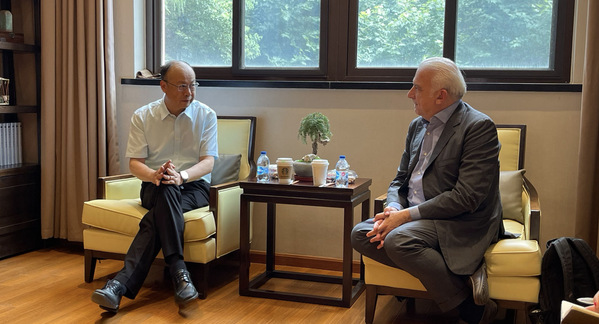
Prof. Zhimin Chen, FDU Vice President had a curtesy meeting with Mr. Daniele Violetti, Senior Director of Programme Coordination, UNFCCC before the Special Workshop.
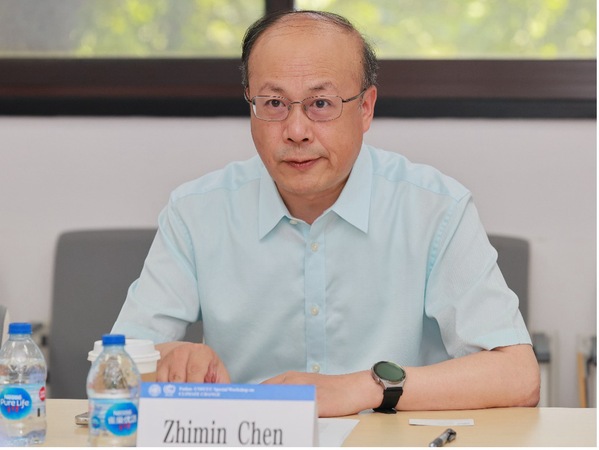
Prof. Zhimin Chen is giving the Opening Remark
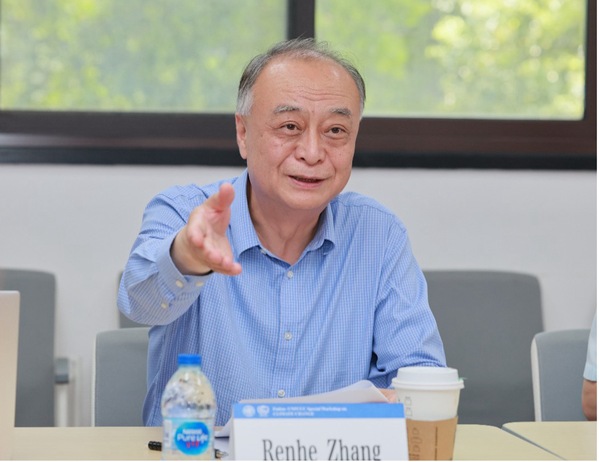
Prof. Renhe Zhang is moderating the workshop
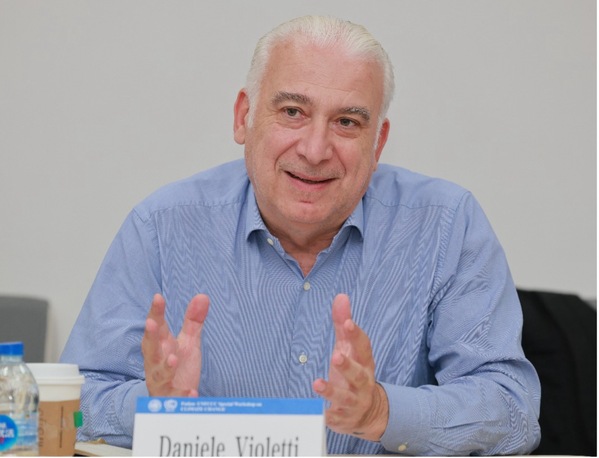
Mr. Daniele Violetti is giving a Responding Speech
During the workshop, Fudan University experts gave presentations on key issues and scientific questions related to global climate governance:
· Prof. Guihua Wang, Dean of the AOS, introduced the impact of climate change on offshore to coastal ocean circulation processes, specifically discussing adaptation strategies for ocean currents, sea level changes, tropical cyclones, and saltwater intrusion.
· Prof. Xu Tang, from FDDI and IAS, and Executive Director of the IRDR ICoE, introduced the characteristics of the new normal of extreme weather and climate events, the progress of interdisciplinary research at the ICoE, and the climate change adaptation and resilience governance initiative based on scientific research. He emphasized the importance of integrating climate change adaptation with resilience building and showcased Fudan University's progress in risk governance research, including the scientific framework for climate resilience and the quantitative estimation of mitigation and adaptation processes using complex system models.
· Prof. Zhiyan Zuo, a lead author of the IPCC Sixth Assessment Report Working Group I, from the AOS, analyzed the accelerated drying and warming of global land, proposed adaptation pathways, and suggested measures to maintain soil moisture to help achieve the goals of the Paris Agreement.
· Prof. Rong Wang from the Department of Environmental Science and Engineering and the System Modelling Lab of FDU IRDR ICoE, discussed coupled modeling, quantitative assessment and projections for food security and energy transition pathways. He focused on coupling socioeconomic systems with Earth system models to predict the impacts of climate change on food production, biomass development, and renewable energy capacities, providing countermeasure suggestions.
· Associate Prof. Jingyuan Xu from the GPPI shared findings from a comparative study of climate policies between China, the United States, and Australia, focusing on governance frameworks for climate adaptation and emphasizing the lessons learned from different countries.
· Assistant Prof. Haoqi Qian from the GPPI introduced the co-benefits analysis of climate finance in African countries, providing evidence of how climate finance impacts the achievement of sustainable development goals (SDGs) and emphasizing the need for targeted approaches to align finance with the priorities of recipient countries.
· Assistant Prof. Yang Zhou from the Institute of Big Data discussed the interaction and sequencing of global climate policies, emphasizing the importance of understanding policy synergies and conflicts to enhance emission reduction efforts.
In the interactive session, Ms. Aiping Chen, special assistant to the Senior Director of the UNFCCC Secretariat, introduced the key work priorities and achievements of the UNFCCC in 2023. She also looked forward to the future key issues and major challenges in global climate governance in conjunction with the preparations for the 2024 global climate conference (COP29) and the first Paris Agreement Transparency Report.
During the discussion session, Prof. Renhe Zhang and Mr. Daniele Violetti had an in-depth exchange on the broad cooperation between Fudan University and the UNFCCC in the fields of scientific research, education, talent training, and achievement promotion in climate change. Both expressed high expectations for broader cooperation in the future. Participants were confident in Fudan University's innovative adaptation solutions and technological support for climate governance in the post-stocktake period, marking an important step forward in Fudan University's contribution to global climate governance.
